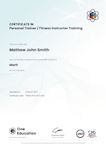- Exam(s) / assessment(s) is included in price
- Tutor is available to students
General Chemistry
Level 7 Endorsed Advanced Diploma | 180 CPD Points | Exam & Full Tutor Support Included | 24x7 Access
One Education
Summary
Overview
The General Chemistry is all you need to advance your career in relevant fields.
Enrol now to discover everything you need to know about the General Chemistry and the skills to improve your talents in this field and be confident in your knowledge bucket with One Education as your right hand!
Meet the Endorsement
The Quality Licence Scheme has been designed specifically to recognise high-quality courses. This General Chemistry course materials are recognised by Quality Licence Scheme (QLS). This ensures the deep research and quality resource allocation behind the development phase of the course. In addition, the QLS certificate enriches your CV and recognises your quality study on the relevant subject.
Meet the Accreditation
CPD Quality Standards (CPD QS) & IAO accreditation assure the General Chemistry course training and learning activities are relevant, reliable, and upto date.
Expert Support
Dedicated tutor support and 24/7 customer support are available to all students with this premium quality course.
Key Benefits
- Learning materials of the Design course contain engaging voiceover and visual elements for your comfort.
- Get 24/7 access to all content for a full year.
- Each of our students gets full tutor support on weekdays (Monday to Friday)
Achievement
CPD
Course media
Description
Course Curriculum:
Unit 01: ABOUT THE COURSE
- Learning objectives
- Example of a solved problem
Unit 02: Quantities and Units
- System of measurement
- International system of units
- Temperature units and scales
- Use and misuse of units
- Dimensional analysis
- Quantities and units: Solved problems
Unit 03: Atomic, Molecular and Molar Masses
- Atoms
- Nuclei
- Periodic table
- Relative atomic masses
- Moles
- Symbols, formulas and molar masses
- Atomic, molecular and molar masses – Problems with solutions
Unit 04: Formulas and Compositions
- Empirical formula from composition
- Composition from formula
- Nuclidic molecular masses and chemical formulas
- Formulas and compositions: Solved problems
Unit 05: Inorganic Nomenclature
- Introduction to nomenclature
- Naming binary compounds of nonmetals
- Naming ionic compounds
- Naming monoatomic cations
- Naming polyatomic cations
- Naming monoatomic anions
- Naming oxyanions
- Naming special anions
- Putting the names of the ions together
- Writing formulas for ionic compounds
- Naming inorganic acids
- Naming acid salts
- Naming hydrates
Unit 06: Chemical Equations
- Introduction to chemical equations
- Molecular relations from equations
- Mass relations from equations
- Limiting reactant
- Calculations from chemical equations: Solved problems
- Types of chemical reactions
Unit 07: Measurement of Gases
- Pressure
- Gas laws
- Boyle’s law: Constant temperature
- Charles’ law: Constant pressure
- Gay-Lussac’s law: Constant volume
- Combined gas law
- Density of an ideal gas
- Dalton’s law for partial pressures
- Collecting a gas over a liquid
- Deviation from ideal beahvior
- Measurement of gases: Solved problems
Unit 08: The Ideal Gas Law
- Avogadro’s hypothesis
- Molar volume
- Ideal gas law
- Gas volume relations from equations
- Gas stoichiometry involving mass
- The ideal gas law: Solved problems
Unit 09: Thermochemistry
- Heat
- Energy and enthalpy
- Enthalpy changes for various processes
- Rules of thermochemistry
- Thermochemistry – Problems with solutions
Unit 10: Atomic Structure
- Characters of light
- Interaction of light with matter
- Particles and waves
- Orbitals
- The Pauli exclusion principle
- Aufbau principle
- Electron configuration
- Atomic radii
- Ionization energies
- Electron affinity and magnetic properties
- Atomic structure – Problems with solutions
Unit 11: Chemical Bonding and Molecular Structure
- Introduction to chemical bonding
- Octet rule
- Ionic bonding
- Electron dot notation
- Covalent bonding
- Distinction between ionic and covalent bonding
- Predicting the nature of bonding in compounds
- Formal charges
- Dipole moment and electronegativity
- Hybrid orbitals
Unit 12: Solids and Liquids
- Crystals
- Close packing
- Crystal forces
- Liquid forces
- Solids and liquids: Solved problems
Unit 13: Oxidation - Reduction
- Introduction to redox reactions
- Oxidation number
- Oxidizing and reducing agents
- Ionic notation for equations
- Balancing oxidation-reduction equations
- Oxidation-reduction: Solved problems
Unit 14: Concentration of Solutions
- Composition of solutions
- Concentrations
- Molarity
- Normality
- Molality
- Mole fraction
- Comparison and summary of the concentration units
- Dilution problems
- Concentration of solutions: Solved problems
Unit 15: Reaction Involving Standard Solutions
- Reactions involving standard solutions
- Reaction involving standard solutions: Solved problems
Unit 16: Properties of Solutions
- Introduction to chemical solutions
- Vapor pressure lowering
- Freezing point lowering
- Boiling point lowering
- Osmotic pressure
- Solution of gases in liquids
- Law of distribution
- Properties of solutions: Solved problems
Unit 17: Thermodynamics
- The first law
- The second law
- Entropy
- The third law
- Standard states
- Chemical equilibrium
- The equilibrium constant
- Le Chatelier’s principle
- Thermodynamics – Problems with solutions
Unit 18: Acids and Bases
- Arrhenius concept
- Brönsted-Lowry concept
- Lewis concept
- Ionization of water
- Hydrolysis
- Buffer solutions
- Indicators
- Polytropic acids
- Titration
- Acids and bases – Problems with solutions
Unit 19: Complex Ions and Precipitates
- Coordination complexes
- Solubility product
- Precipitation
- Complex ions and precipitates: Solved problems
Unit 20: Electrochemistry
- Electrical units
- Faraday’s laws
- Voltaic cells
- Standard half-cell potential
- Combining couples
- Free energy and Nernst equation
- Electrolysis
- Electrochemistry: Solved problems
Unit 21: Rates of Reactions
- Introduction to rates of reactions
- Rate constants and order of reactions
- First order reactions
- Other rate laws
- Energy of activation
- Mechanism of reaction: Molecularity
- Mechanism of reaction: Energetics
- Rates of reactions: Solved problems
Course Assessment
To simplify the procedure of evaluation and accreditation for learners, we provide an automated assessment system. Upon completion of an online module, you will immediately be given access to a specifically crafted MCQ test. The results will be evaluated instantly, and the score will be displayed for your perusal. For each test, the pass mark will be set to 60%.
When all tests have been successfully passed, you will be able to order a certificate endorsed by the Quality Licence Scheme.
Certificate of Achievement
Endorsed Certificate of Achievement from the Quality Licence Scheme
After successfully completing the General Chemistry course, learners will be able to order an endorsed certificate as proof of their achievement. Hardcopy of this certificate of achievement endorsed by the Quality Licence Scheme can be ordered and received straight to your home by post, by paying
- Within the UK: £129
- International: £129+ £10 (postal charge) = £139
- CPD & IAO Accredited Certification from One Education
After successfully completing this General Chemistry course, you will qualify for the CPD & IAO accredited certificate from One Education. Certification is available in both PDF & hardcopy format, which can be received by paying —
- PDF Certificate: £9
- Hardcopy Certificate (within the UK): £15
- Hardcopy Certificate (international): £15 + £10 (postal charge) = £25
Who is this course for?
This General Chemistry course is designed to enhance your expertise and boost your CV. Learn key skills and gain a certificate of achievement to prove your newly-acquired knowledge.
Requirements
This General Chemistry course is open to all, with no formal entry requirements.
Career path
Upon successful completion of the General Chemistry Course, learners will be equipped with many indispensable skills and have the opportunity to grab.
Questions and answers
Will there be any additional charges to this price over the course ? Thanks
Answer:Dear Sofie, Thank you for your question. There is no additional charge applicable for accessing the course.
This was helpful.
Reviews
Currently there are no reviews for this course. Be the first to leave a review.
Legal information
This course is advertised on reed.co.uk by the Course Provider, whose terms and conditions apply. Purchases are made directly from the Course Provider, and as such, content and materials are supplied by the Course Provider directly. Reed is acting as agent and not reseller in relation to this course. Reed's only responsibility is to facilitate your payment for the course. It is your responsibility to review and agree to the Course Provider's terms and conditions and satisfy yourself as to the suitability of the course you intend to purchase. Reed will not have any responsibility for the content of the course and/or associated materials.
FAQs
Interest free credit agreements provided by Zopa Bank Limited trading as DivideBuy are not regulated by the Financial Conduct Authority and do not fall under the jurisdiction of the Financial Ombudsman Service. Zopa Bank Limited trading as DivideBuy is authorised by the Prudential Regulation Authority and regulated by the Financial Conduct Authority and the Prudential Regulation Authority, and entered on the Financial Services Register (800542). Zopa Bank Limited (10627575) is incorporated in England & Wales and has its registered office at: 1st Floor, Cottons Centre, Tooley Street, London, SE1 2QG. VAT Number 281765280. DivideBuy's trading address is First Floor, Brunswick Court, Brunswick Street, Newcastle-under-Lyme, ST5 1HH. © Zopa Bank Limited 2024. All rights reserved.





